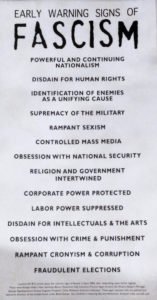Read it here: https://www.wattpad.com/588389929-the-mechanical-crown-late-warning-signs
Arc 5 starts grim. It’s grim in the mountains, it’s grim back home. In ‘Late Warning Signs’ we find out just how far King Guijus has fallen. He’s a man with no clear motivation. He doesn’t know WHY he does what he does: he was born into a role, and tries to play it, but has no deeper driving force. When Kirya and Fenris were still about he had them to steer him; now that they’re gone, it’s all unravelling, with his fears and paranonia and regrets bubbling to the surface and driving his actions.
Those actions are to appeal to the worst populist instincts, because he knows that will gain him favour with the people. It gives him a resurgence of power after the instability of the previous months. It’s an illusory, instable power, but it’s power undeniably.
This chapter’s title references and is directly structured around the ‘Early Warnings of Facism’ poster, which did the rounds on the internet in early 2017 (possibly accompanied by a seismic political event? I don’t recall…) and which I believe originates from the US Holocaust Museum.
Lagonia isn’t starting off as a democracy, of course – far from it. It has, however, enjoyed benevolent rule for a while under a semi-feudal system that has settled down into a relatively mature society with a relatively high quality of life (albeit with high levels of inequality). I turned to the ‘Early Warnings Signs’ poster to help depict Guijus’ descent.
Here’s how I broke down the warnings, and applied Lagonian politics to them. Some of these emerged directly in this chapter, while others haven’t been directly witnessed yet. These are quoted directly from my planning notes for this chapter:
– Powerful and continuing nationalism
Lagonia above all else. Treydolain centralism. Suspicion of outsiders. Lagonia and the valley are the promised land.
– Disdain for human rights
Flattening of poor quarter to make way for new barracks and training grounds. Mandatory conscription.
– Identification of enemies/scapegoats
Bruckin. The Headland. Outsiders generally. Traitors. Fenris Silt. Repositioning Seldon as a foreign agent, who never had backing of the king.
– Supremacy of the military
Conscription, mass rally to drum up support, show of force.
– Rampant sexism
N/A – Lagonia is a surprisingly equal society from a gender perspective.
– Controlled mass media
N/A – there isn’t much of a media to start with, controlled or otherwise.
– Obsession with national security
Security and rule of law above all. Trust no-one. Beware of outsiders. Listen for careless talk.
– Religion and government intertwined
N/A – Lagonia is a mostly post-religious state.
– Corporate power is protected
N/A – doesn’t directly apply to Lagonian society.
– Labour power is suppressed
Conscription, forced work to produce weapons etc.
– Disdain for intellectuals and the arts
Nobility stamped down upon – Verase and co, who Guijus now sees as a direct threat and has the opportunity to wipe them out.
– Obsession with crime and punishment
Public executions, clearing of the poor quarter. Accelerated imprisonment, sent down to the mines to accelerate source production.
– Rampant cronyism & corruption
Guijus cutting out all expert advisers. Pushing King’s Eyes away.
Fraudulent elections
N/A
The ‘early warning signs’ really helped to define what needed to happen at this point in the story and enabled me to relate it back to real world themes.
In the intitial draft of the chapter I got a bit too close to reality, with Guijus promising to ‘make Lagonia great again’. At the time of writing I had a feeling I should cut or change the line, but left it in. The next day I realised that I should have listened to my instincts, and thus the line was altered to be less on the nose.
Aside from the politics, what this chapter is REALLY about is Stryke going the rest of the way towards thinking on his own, and realising that the Lagonia he’d fought to protect for decades no longer exists. What he does next will be veeeery interesting…

0 Comments